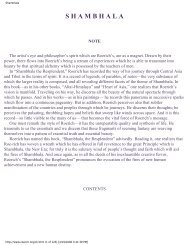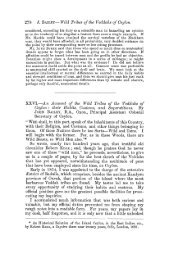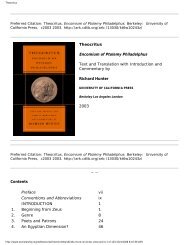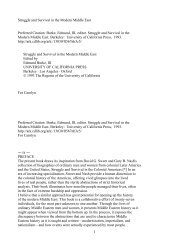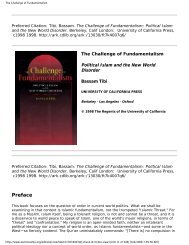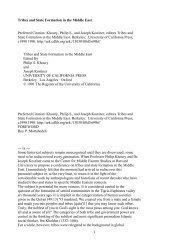Between Two Worlds Kafadar.pdf
Between Two Worlds Kafadar.pdf
Between Two Worlds Kafadar.pdf
You also want an ePaper? Increase the reach of your titles
YUMPU automatically turns print PDFs into web optimized ePapers that Google loves.
also be seen to embody a compact of sovereignty. [36] Osman, like many other<br />
warriors in the region, must indeed have dreamt of rulership, in the nonspecific<br />
sense of dreaming. At some point after his emergence, he or his descendants<br />
advanced the story of the dream to give his political bid the sanction of a<br />
divine compact, but the consensus on the veracity of the dream, as in all<br />
compacts, implied not only that the House of Osman's power should be accepted<br />
because it had divine sanction but also that the House of Osman had some<br />
obligations in return. Did the dream not include a promise (and a vow?) of<br />
security and prosperity for the subjects? In a way, then, the dream narrative<br />
served as one method of working toward a political consensus.<br />
If the dream legend can be read as a compact, the interpreter (Ede<br />
― 133 ―<br />
Bali or `Abdu`aziz or Haci Bektas ) can be seen as the notary of its contractual<br />
character. He is the one who verifies it and provides it with legitimacy in the<br />
public sphere. This is not different from the role that is said to have been<br />
given to a sheikh at each accession when he girded the new ruler with a sword<br />
and thereby, I would add, notarized the transfer of power and reconfirmed the<br />
compact. [37] Unfortunately, the early history of that ritual, eventually a<br />
sphere of contestation between different Sufi orders just like the identity of<br />
the interpreter of Osman's dream, is shrouded in mystery. It is not even dear<br />
that such a ritual did in fact take place in the fourteenth century. As for the<br />
dream legend itself, it must have been elaborated, at least as we have it, after<br />
the emergence of a sedentary preference among the Ottomans since it dearly<br />
offers a particularly sedentary vision of the future under their rule, as<br />
Lindner has insightfully pointed out in analyzing its manifest content.<br />
Whatever the role of fiscal moderation in rendering Ottoman rule acceptable or<br />
tolerable, this must have been buttressed by the security that would come to an<br />
area under some stable rule, be it Ottoman or otherwise, after protracted<br />
turmoil, caused by Ottomans or others. In the case of northwestern Anatolia, the<br />
peasants of the area were so frustrated that they were ready to follow the<br />
rebellion of a pseudo-Lachanes in 1294.<br />
All this was certainly facilitated by the decline in the direct interest of<br />
Byzantine central government in that area.[38] As the empire's political<br />
attention in the post-Lascarid period mined toward the west, Bithynia lost some<br />
of its significance and its defenses were neglected. The disappointment of<br />
imperial subjects of the area was probably compounded, as Lindner points out, by<br />
the fact that they had enjoyed a high level of security and stability under<br />
Lascarid role from Nicaea. From the point of view of the Ottomans, however, this<br />
"backwater" status of Bithynia at the time turned out to be advantageous not<br />
just bemuse of the weak defensive system they encountered but also became they<br />
could expand and build without attracting too much attention from the larger<br />
powers. In this neglected area whose Christian inhabitants seem to have been<br />
disenchanted with their imperial government, there would also be a better chance<br />
of gaining former Byzantine subjects to the Ottoman side or at least of having<br />
them become reigned to, if not welcome, the establishment of Ottoman power.<br />
The point about Byzantine neglect of Bithynian defenses should not be<br />
117




